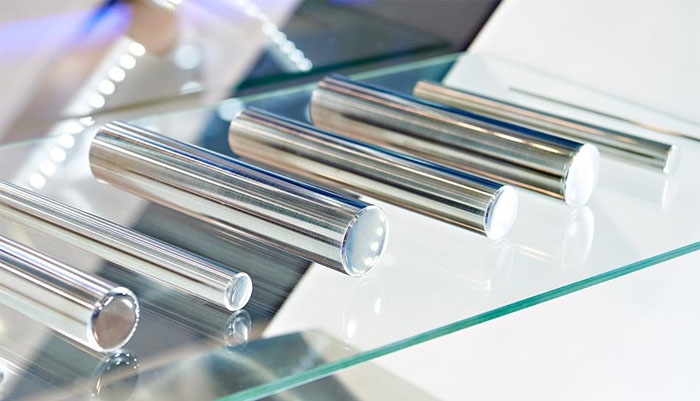
Nickel-based alloys with other elements added. Nickel can form a variety of alloys with copper, iron, manganese, chromium, silicon, and magnesium. Nickel alloys can be used as materials for electron tubes, precision alloys (magnetic alloys, precision resistance alloys, electric heating alloys, etc.), nickel-based high-temperature alloys, and nickel-based resistant alloys. Corrosion alloys and shape memory alloys, etc. Nickel alloys are widely used in sectors such as energy development, chemical industry, electronics, navigation, aviation and aerospace.
ApplicatioClassification of nickel alloys
· Nickel-based superalloy. The main alloying elements are chromium, tungsten, molybdenum, cobalt, aluminum, titanium, boron, zirconium and so on. Among them, chromium plays an anti-oxidation and anti-corrosion role, and other elements play a strengthening role. It has high strength, oxidation resistance and gas corrosion resistance at high temperature of 650~1000℃. It is the most widely used high temperature alloy in high temperature alloy. The scarcity of talents in this area is mainly concentrated in the iron and steel talent network. It is used to manufacture high-temperature parts of aero engine blades and rocket engines, nuclear reactors, and energy conversion equipment.
· Nickel-based corrosion-resistant alloy. The main alloying elements are copper, chromium, and molybdenum. It has good comprehensive performance and can resist various acid corrosion and stress corrosion. The earliest application is nickel-copper alloy, also known as Monel; in addition, there are nickel-chromium alloy, nickel-molybdenum alloy, nickel-chromium-molybdenum alloy and so on. Used in the manufacture of various corrosion-resistant parts.
· Nickel-based wear-resistant alloy. The main alloying elements are chromium, molybdenum, and tungsten, but also contain a small amount of niobium, tantalum and indium. In addition to wear resistance, its oxidation resistance, corrosion resistance, and welding performance are also good. It can be used to manufacture wear-resistant parts, and can also be used as a coating material, which can be coated on the surface of other base materials through surfacing and spraying processes.
· Nickel-based precision alloy. Including nickel-based soft magnetic alloys, nickel-based precision resistance alloys and nickel-based electric heating alloys. The most commonly used soft magnetic alloy is Permalloy containing about 80% nickel. Its maximum permeability and initial permeability are high, and its coercivity is low. It is an important core material in the electronics industry. The main alloying elements of nickel-based precision resistance alloys are chromium, aluminum, and copper. This alloy has high resistivity, low temperature coefficient of resistivity and good corrosion resistance, and is used to make resistors. Nickel-based electric heating alloy is a nickel alloy containing 20% chromium, which has good oxidation resistance and corrosion resistance, and can be used for a long time at a temperature of 1000 to 1100°C.
·Nickel-based shape memory alloy. A nickel alloy containing 50(at)% titanium. The recovery temperature is 70°C, and the shape memory effect is good. A small change in the proportion of nickel-titanium components can change the recovery temperature within the range of 30-100°C. It is mostly used in the manufacture of automatic opening structural parts used in spacecraft, self-exciting fasteners used in the aerospace industry, and artificial heart motors used in biomedicine.

High nickel alloys can be used in the following industries
··
·
·
·
·
Xinkang Advanced Materials Co., Ltd. is a provider of metal materials. Our main products include rod, plate, pipe, foil, wire, coil, disc, flange, ring, ball, crucible, fasteners, CNC machined parts, standard parts and non-standard parts, etc. If you have any material questions,please consult us.





